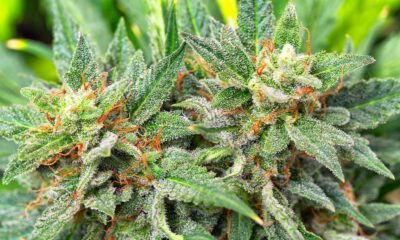
Joint Opinions
Women in Cannabis Have Twice as Much to Lose
The Women’s March on Washington and sister marches in more than 500 cities mobilized over 3 million people to demand equality and justice, with an emphasis on women’s reproductive and personal freedom. Women in the cannabis industry were well represented at these marches and rallies, and it’s easy to understand why: the uncertainties surrounding President Donald Trump’s incoming administration have many of them feeling vulnerable both personally and professionally.
From coast to coast, millions came out in support of Women’s Rights, with a sizable contingent from one of America’s friendliest industries, cannabis, making a strong showing.
For women in the cannabis industry, the angst brought on by the inauguration of Donald Trump is twofold; not only do they have to worry about their reproductive rights being in the hands of a con man and his Alternative Fact-filled administration, they also have to wonder about the future of the industry that’s given them a better shot at leadership and success than any other.
For years, cannabis has been a best option for aspiring female entrepreneurs. Newsweek famously reported that cannabis “could be the first billion-dollar industry not dominated by men.”
There’s still plenty of chauvinism to go around within the cannabis industry — and nobody is claiming the days of using cleavage to sell various wares are behind us — but the numbers when it comes to female involvement and leadership tell a different story.
In late 2015, Marijuana Business Daily broke down the prevalence of women in executive roles in the industry. While in the broader workforce of american industry women only make up roughly one in five of the people filing leadership positions, in cannabis the number is far higher at roughly one in three. The two areas in the industry where they are most dominant are in the lab testing field where they make up 63 percent and in the infused products processing and production space where they make up 48 percent.
One of the many canna-pros who hit the street on Saturday was Shaleen Title of THC Staffing. She talked about the parallels between working to protect her place in an emerging industry and working to protect her rights and place under an emerging Trump presidency.
“I guess the way I think about this struggle is that it’s about each of us individually taking power — whether it’s making laws, starting businesses, or refusing to give up autonomy over our own bodies — and collectively using that power to stand up for each other,” Title said. “Particularly women with more power standing up for women who are marginalized.”
She went on to compare the very focused regime of policy work to the kinds of activism energy we see from larger scale protests.
“As an activist who is used to laser-focusing on a specific policy change, large-scale protests are a whole different energy,” said Title. “It’s tempting to want to push people into the next steps of organizing to figure out their goals and strategies. But I think it’s important for more experienced activists to resist that temptation and meet people where they are.”
Title added that keeping spirits high and enthusiasm up would be a major catalyst to keeping the ball rolling.
“We want people to find intrinsic motivation in their activism, something that brings them back, not for them to feel like it’s a chore or that they are being admonished for not doing enough,” she said. “The truth is that all of us could do more. But one lesson I learned with drug policy is that if you make activism fun and interesting, people will keep coming back, and that’s when change happens”
For Drug Policy Alliance Marijuana Policy Manager, Dr. Amanda Reiman, the involvement of women in the cannabis industry relative to other industries is a sign of how far things have come.
“The cannabis industry is newly legal, but it has existed underground for a long time, mostly run by men. The emergence of women in the legal industry shows the willingness of women to take risks, to have vision and to jump on opportunity in a way that makes a real difference,” Reiman said. “These general concepts, risk taking, vision and jumping on opportunity have been traditionally described as masculine traits. The cannabis industry is changing that, and perhaps seeing women claim power in industry and/or in protest is threatening to those who cling to antiquated gender roles.”
Despite her cannabis expertise, Reiman has spent much of her time looking at the broader impact of the War on Drugs.
“In drug policy activism, it quickly becomes clear that it’s not about drugs, it’s about oppressing people viewed as threats to some crazy moralistic ideal. Women’s health rights, work rights, voting rights, are more about controlling women than they are about the issues themselves,” she said. “Trying to control a woman’s body, her economic freedom and her role as a parent is ultimately about maintaining the patriarchy. However, not all women are impacted by this control to the same extent. White privilege, economic privilege and biological privilege play a role in the issues addressed by the Women’s March just as much as they do in drug war activism. Recognizing this and naming it is the first step in adopting the values of drug war activism.”
Longtime activist, Diane Fornbacher has had a unique view on women in the cannabis industry for years. NORML’s Women’s Alliance was founded during her time on the organization’s board of directors. In 2013 she went on to found Ladybud Magazine.
Fornbacher said it’s not all sunshine yet for women in the cannabis industry.
”I would not say the cannabis industry has provided women more opportunity in work or pay,” Fornbacher said. “There are many women in the cannabis industry as well as the non-profit sector who do not get paid their worth, nor are able to rise through the ranks as quickly as their male counterparts even while more qualified or experienced”
Fornbacher said, like most progressives, she is not a one issue activist.
“I don’t live exclusively in the cannabis world. I am a worldly citizen with many causes,” she said. “My primary focus has been drug policy but that encompasses a multitude of concentric causes for which I advocate like prison reform, harm reduction, the links between poverty and the drug war, feminist issues, relieving the homeless population and encouraging communities to be involved in sharing resources to alleviate suffering, and so much more.”
The lab space is one of the places in cannabis where women have found themselves ahead of the pack. Emily Joyce, vice president of business development at CW Analytical Laboratories, said the work women like her have put in to make that a reality over the years was not an afterthought as she hit the streets in Oakland, California.
“There’s a lot of uncertainty in the air right now, and being a woman and being a member of the cannabis industry amplifies these feelings,” Joyce said. “If there’s one thing I’ve learned working in this industry for the past seven years, it’s that our ability to conduct business and make a living is never certain, and should never be taken for granted. Apparently, even in 2017, being a woman with the right to make decisions for her own body and her health shouldn’t be taken for granted either.”
Activists plan to continue having their voices heard through the first 100 days of Donald Trump’s presidency, every 10 days will see a different political action. The first action is a massive postcard campaign to the Senate. Judging from the 5 million people who made it out this past weekend, they better be ready for a lot of mail on Capitol Hill.
TELL US, were you at Women’s March or any of its sister marches? What was your experience like?


























